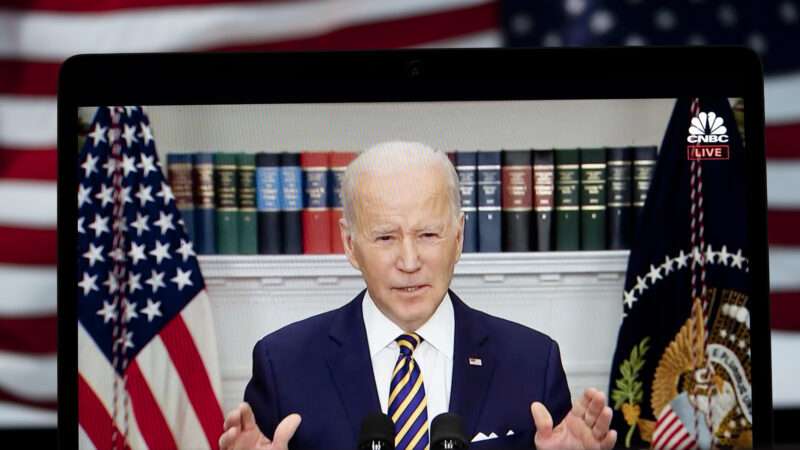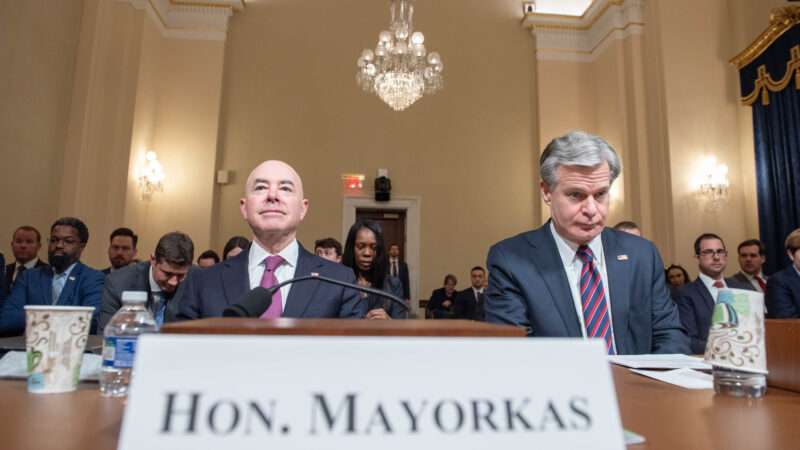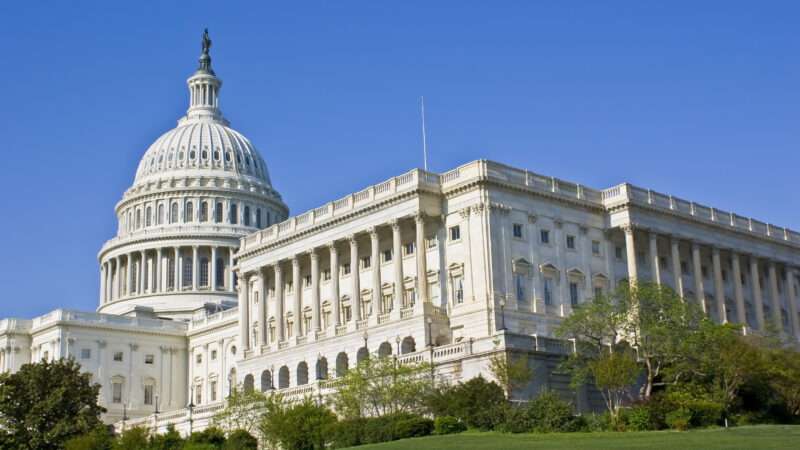As Ronald Reagan’s first budget director, former Michigan congressman David Stockman led the charge to cut the size, scope, and spending of the federal government in the early 1980s. He made enemies among Democrats by pushing hard for cuts to welfare programs—and he ultimately made enemies among his fellow Republicans by pushing equally hard to slash defense spending. His memoir of the era, The Triumph of Politics: Why the Reagan Revolution Failed, is a legendary account of how libertarian principles got sacrificed on the altar of political expediency.
Stockman’s new book is Trump’s War on Capitalism, and it takes a blowtorch to the former president’s time in office. “When it comes to what the GOP’s core mission should be…standing up for the free markets, fiscal rectitude, sound money, personal liberty, and small government at home and non-intervention abroad,” he writes, “Donald Trump has overwhelmingly come down on the wrong side of the issues.”
At a Reason Speakeasy event in New York City, Reason‘s Nick Gillespie talked with Stockman about his political journey from being a member of Students for a Democratic Society who protested the Vietnam War to being one of Reagan’s main advisers to his denunciation of Donald Trump and his hope that Robert F. Kennedy Jr.’s candidacy helps throw the 2024 election into the House of Representatives.
Stockman also explains how Trump led the charge on COVID lockdowns, got rolled by Wall Street and the Federal Reserve, and why his nativist views on immigration are inimical both to freedom and economic growth.
Watch the full video here and find a condensed transcript below.
Nick Gillespie: This is The Reason Interview with Nick Gillespie. Thanks so much for coming out. Our guest tonight is David Stockman. He is a former congressman, a two-termer from Michigan, south of Grand Rapids. Probably best known in the public eye for being Ronald Reagan’s first budget director who made the naive, idealistic, and absolutely wonderful mistake of believing that Ronald Reagan wanted to cut the size, scope, and spending of government across the board. He wanted to cut the welfare-warfare state, right?
David Stockman: Well, the welfare part.
Gillespie: And this is before we get into his fantastic book, a real stinging critique of Donald Trump, Trump’s War on Capitalism. In preparing for this, you as budget director, you came in and you had to cut $40 billion from a $700 billion budget in 1981. To give you a sense of how quaint that is, the defense budget now is about $700 billion. I think we may be approaching that just in interest on the debt. But you were scrounging around to find $40 billion to cut. What happened?
Stockman: Well, I think the problem was Ronald Reagan believed in small government profoundly, except for the Pentagon side of the Potomac River. And he was really a hawk, a real, unreformed, unrequited Cold War hawk. The defense budget was about $140 billion when we got there. By the time he left, it was $350 billion, a massive increase on the theory that the Soviet Union was developing first-strike capability. None of that was true. That was the origination of the whole neocon view of the world. That’s where all these characters originally got their start in the process. And so, by the time we got to 1988, the defense budget had eaten up and then some of all the domestic cuts, and the Republicans who were willing to stand up for domestic spending cuts and title reforms and so forth were so demoralized by seeing these massive increases year after year for the Pentagon that they basically threw in the towel, and the whole thing was kind of a wipeout.
If you want to get the numbers on it, just to kind of cap off the point, when Jimmy Carter left the White House after all those years of big spending by the Democrats, first Carter and then before him, of course, [Lyndon B. Johnson (LBJ)], and guns and butter and all the rest, the domestic non-defense budget was 15.4 percent of [gross domestic product (GDP)]. So way up, historically. When Reagan left, it was 15.3 percent. So he made a 0.1 percent difference. And that’s about all we got.
Gillespie: I would recommend everybody read, The Triumph of Politics, David’s memoir of his time. The subtitle is Why the Reagan Revolution Failed and—if you’re interested in political economy as well as gossip—it’s really one of the great memoirs.
But the book we’re talking about tonight is Trump’s War on Capitalism. The title says it so well there isn’t even a subtitle. Why don’t you start by telling us what was Trump’s war on capitalism? He is a businessman. He talked about having the greatest, the biggest, the best economy ever when he was president. What’s the essence of Trump’s war on capitalism?
Stockman: Well, the question I think you’re getting at is, why did I write it? And the answer is I had already written three books trying to expose the fact that Donald Trump isn’t remotely an economic conservative; he doesn’t believe in small government. I don’t think he believes in free markets. And certainly he had no affinity whatsoever for sound money or fiscal rectitude. So in 2016, I wrote a book called Trumped! to warn people. In 2018, I wrote another book called Peak Trump to say I was right. In 2020, I wrote a third book called Dump Trump. Well, the fourth time would be the charm, right? And the book came out five days before the Iowa primaries. It was too late. But there is a bigger point to it, and that is: We’re never going to get the kind of government, I think, that all of us believe in—the kind of society, the kind of liberty, the kind of economic prosperity, the kind of market capitalism and so forth. Unless there is an honest contest in the process of democratic governance in the United States between one party that more or less lines up as the government party, the party of state, the party of the political class, the bureaucratic class, the apparatchiks in Washington. And there’s a second party that represents the hinterlands and all of the impulses that go with us, to leave us alone, to tax us less, to spend less, to intervene less, to get out of our way, to allow the private society and economy to breathe. So we really need a government party contesting with an anti-government party.
The problem is, today we have a uni-party in terms of the primary leadership in the Republican Party in Washington. When I look at [Mitch] McConnell, who’s been there 55 years on the government payroll, I can’t really tell any difference between him and our senator from New York, the leader on the Democratic side. And so, what I think the great danger is that the problems in the United States today in terms of our position in the world—which is a disaster in terms of our public debt but we can get into a lot of those numbers in a minute—and in terms of a rogue central bank that is totally out of control is that, if we don’t address any of that, then [we will have continued rule of the uni-party], and we can’t have [that]. We need to break it up. But Donald Trump, despite all of his rhetoric and all of his loud boasting about draining the swamp and being the outsider and coming in to clean up the whole thing, is just as much a statist when it comes to all the key issues. And we go through them in the book, as well as most of the mainstream politicians in Washington.
So the last thing we need is a fight in 2024 between Trump and Biden. It’s pointless. It’s useless. We need to have a clean break in the Republican Party, blow it up if we have to, and not allow the second party in our democracy to be Trumpified. Because if it’s Trumpified, then we get more of what we had during the four years that he was there. I’ve got a lot of data on that, but let me just cap it here with one, and then we can go into some of the details. When Trump was sworn in, the public debt was $20 trillion already, and it had been swelling rapidly for several decades. When he left, it was close to $28 trillion. So let’s just call it $8 trillion in four years. Now, someone might ask later, numbers of this magnitude are almost hard to grasp, to understand, but here’s how to understand: The first $8 trillion, equivalent to the $8 trillion that Trump racked up in four years, had taken from the first day of the Republic to 2005 to approve. That is, the first 43 presidents in 216 years generated $8 trillion in public debt. Trump replicated that in four years, not only because of huge tax cuts that he didn’t try to offset with spending but because of the whole disaster of the pandemic, the COVID, the lockdowns, and $6.5 trillion worth of bailout and relief and free stuff that came out of the effort to try to tell people, “Yeah, we’re sending everybody home. And don’t worry, we’ll send you money too.” So, that’s the heart of the matter.
Anybody that can generate $8 trillion in four years of additional public debt, equal to the first 43 presidents—and there were some real rascals, obviously, and bad guys in that lineup, including [Franklin D. Roosevelt] and LBJ and a lot of others in between—that’s the kind of number that grasps you by the collar and tells you, this guy is part of the swamp. He’s not part of the solution.
Gillespie: What is wrong with running up massive debt?
Stockman: Someone asked me that in 1970 when I first went to work on Capitol Hill. I ran for Congress in 1976 against the outgoing [Gerald] Ford deficits, which were large. And the question was raised, and here we are. And it’s now $34 trillion and rising and so, maybe it’s no problem after all.
No, the answer is there are two ways to finance the deficit, both of them bad. The first way is the honest way: You finance it in the bond pits by borrowing out of the private savings stream. The effect of that, though, everybody understood when I was first on Capitol Hill in the ’70s and into the early ’80s, is that when you finance the public debt deficits the honest way, it causes crowding out. It forces up interest rates higher and higher, because whatever the given supply of savings is at the moment. Uncle Sam is the sheriff. His elbows get first call on the money. Crowding out happens. Rates go up. That’s where we got the famous bond vigilantes and so forth. And that’s why, actually, when we were trying to cut taxes in the early ’70s, what I called the College of Cardinals—the established, seasoned Republican leaders in the House: Bob Dole, Sen. [Pete] Domenici, Howard Baker, who was the Senate leader—they said, “No, we’ve got to be careful here, because if we finance all of these tax cuts with red ink and borrowing, we’re going to crowd out private investment. We’re about to hear from our car dealers who can’t finance their lot. We’re going to hear from our home builders whose customers can’t get mortgages,” and so on. So the point is, if you finance it the honest way, you cause crowding out, you get an early reaction economically. You basically suppress productive investment and you shift society’s resources to “government investment”—if you think that’s a word, and I don’t. I think it’s an oxymoron.
The honest way of financing the deficits, which by the way, had to be done in the late ’70s and early ’80s because Paul Volcker was sitting in the chair at the Fed, and he was not about to monetize the debt. As a result, we had an environment in which the political reaction function, the feedback, was almost instantaneous. Run big deficits, drive up interest rates in the bond pits. Those spread to the banking sector. Those spread to the hometown car dealers and homebuilders and SNL bankers and just regular consumers. And it causes a political reaction that tends to create a constituency in the political system in Congress for reining in the deficit. That’s the first way.
The second way is to issue all kinds of public paper and have the central bank buy it. And that’s called monetization. And that’s exactly what we’ve been doing ever since the late ’70s or late ’80s, effectively after Volcker left. And let me just give you some idea of how much has been monetized. When [Alan] Greenspan took over, and you remember, this is 1987, he was allegedly at one time a great believer in the gold standard and an Ayn Rand disciple and other things. He sort of lost his economic rigidities. He was kind of nerdy. But in any event, the balance sheet of the Fed was $200 billion, and this is 1987. So it has something like 70 years of the Fed’s existence. It had taken 70 years to get to $200 billion. And I’m going to talk a lot about the balance sheet of the Fed and people say, “What does that mean? Why is that such a big deal?” The balance sheet of the Fed is simply the track record of how much cumulative money they seized out of thin air and printed, fiat credit, over time. So we had $200 billion.
To cut this story short, until they decided that inflation was out of control about a year ago and began to pull back, the balance sheet of the Fed had reached $9 trillion. Now, this is in a lifetime. I am looking out here, I can see probably quite a few people that might have been around in 1987. You went from $200 billion to that $9 trillion. That’s 45 times growth in that period of time—several decades—at a point when the GDP was only increasing by 5x.
So when the money printed by the Fed goes up 45 times and the size of the economy goes up five times, you are way, way, way, out of kilter, out of skew. And it is that massive, continuous money printing which monetized all of the debt being created by a reckless Congress and White House that allowed us to continue to run these huge budget deficits year after year. But eventually it catches up with you as well.
There’s this famous thing, I think it’s Hemingway’s book where he’s asked, “How did you go bankrupt?” And the answer was, “Slowly at first, then all of a sudden.” What I’m trying to get at here is the honest way to finance the deficit will cause problems very quickly. What we’re doing is the slow way, but we’ve created massive financial bubbles. Massive misallocation of resources, tremendous amounts of speculation that should never happen in a healthy economy and wouldn’t happen. And it’s permitted this to go on much longer than would have been the case if we had done it the honest way. But, now we’re at the point where I think the chickens are coming home to roost. Even the Fed has stopped printing money because inflation was out of control.
Gillespie: So to bring it back to Trump, Trump made a big deal about caring about the forgotten man, talking about Main Street vs. Wall Street, all of that. Your book makes the case that whatever he’s saying, he’s actually helping Wall Street or the financial sector far more than production sectors and service sectors of the economy. Talk a little bit about his tariffs and his immigration policy. He’s trying to help small producers, saying we’re going to keep China from dumping cheap products here so you can have your industry here. Why is that wrong?
Stockman: The big irony about Trump is that he was the outsider who campaigned against the status quo, the establishment, the deep state, and the political class. And that all made for good rhetoric, and it actually resonated with the public. But when you look at what his policy solutions are, they have nothing to do with draining the swamp. Trump’s basic take on why all these people were left high and dry in flyover America and in the Rust Belt, and why we lost millions and millions of jobs, and why manufacturing is going to China and elsewhere is that this was all due to the work of nefarious foreigners. Foreign governments that were cheating and unfair in their trade practices. Immigrants coming across the border in hordes, who were allegedly bloating our welfare state and undermining our economy and undermining our security.
Gillespie: That’s always the great thing, right? Immigrants are simultaneously coming here for welfare and then outworking us.
Stockman: Yeah. But see, the point is if you want to drain the swamp, then you better go to the swamp and change the policies. Ask what has caused all of this disorder, distrust, and failure. That would have pointed exactly to the Federal Reserve because it’s been pro-inflation since the ’70s. And then it made inflation official with its 2 percent target. And it was that pro-inflation policy decade after decade that priced out the world market. It’s that simple.
I look at one statistic that I’ve got in the book that looks at the cumulative increase in unit labor costs over the decades. And that’s important because remember what unit labor costs are: It’s when wage cost increases—benefits and pay—[while productivity remains the same or decreases]. Because if you have wage increases and you have equal productivity gains, then the cost of production doesn’t change. And a business can go on and expand and thrive without raising the prices. But if wages are increasing dramatically, more rapidly than productivity, because you have a pro-inflation policy being run by the central bank, then over time, unit labor costs get totally out of control. And here’s a startling number: From 1970 when we basically flushed sound money down the drain at Camp David—in 1971, actually, [Richard] Nixon [was president]—from then until the present, unit labor costs in the United States have risen 275 percent. And as a result of that, we have priced ourselves out of the services market because all of the services have gone to India and other low-wage countries, to say nothing of the merchandise goods market that has gone to Mexico and China and so forth.
I have one little thing in the book that gives a pretty good example. IBM was the great monster, the midway at one point in terms of making the computer hardware, which is the modern economy. But between 1990 and the present, their employment in India has gone from zero to about 180,000, and their employment in the United States has been cut by more than a third. So, that’s on the services side to say nothing of what happened to these massive year-in, year-out, merchandise trade deficits. Why did that happen? It all happened because of the unit labor costs increasing at these rates. It happened because you had a pro-inflation rather than a pro-deflation central bank. And ironically, it happened because Milton Friedman gave Richard Nixon—tricky Dick, as we all fondly call him—some very bad advice. He said, “OK, we’re going to unlink the dollar from its base, from its link to gold. But don’t worry about that, because the free market will take care of exchange rates.” And what that really meant was that if we inflated too much domestically, relative to the rest of the world, our exchange rate would go down. All of a sudden, the imports would cost a lot more, our exports would be less competitive, and there would be a disciplining mechanism, a braking mechanism that would prevent huge increases in the trade deficit and the offshoring of production. And that’s what Friedman told Nixon. Now, in theory, he was probably right, but in practice, he was utterly wrong, because what happened over the last five decades is all the central banks in the world have engaged in dirty floats. And so there never was a free market.
Gillespie: Could you explain what a dirty float is?
Stockman: A dirty float basically says, rather than let the market clear in terms of the exchange rate between, say, the dollar and the yen, or the dollar and the euro, or the dollar and Mexican peso, the central bank stepped in and tried to peg the exchange rate. They believe if they peg their exchange rates low, it’ll help their export factories. It’ll help jobs. It’ll help prosperity. They can export more to the rest of the world. That’s called mercantilism. And what the Fed has done after 1971 is spread a massive monetary disease in the world called mercantilist monetary policy. I’ve got a lot of examples in the book of why we’ve lost so much production and jobs to Mexico—and to say nothing of China. [This is all] basically because the Fed said it’s OK to manipulate your currency. It’s OK to increase your domestic money supply at huge unsustainable rates because we’re doing the same thing here. And so as we flooded the world with fiat dollars, the Fed’s balance sheet went—as I said, just in that short period of time—from $200 billion to $9 trillion. The rest of the world, these other central banks, but particularly the Asian ones and also the Persian Gulf, oil Petro central banks, bought in dollars hand over fist. But the secret in that whole thing is when they were buying dollars to keep their exchange rate from rising, they were basically selling their own currency to the domestic market. In other words, the Fed was exporting inflation, and the other central banks reciprocated by buying up the dollars and inflating their own money supplies.
Now, why am I going into all this? Because that meant that what Friedman said [about] the automatic adjustment mechanism of the free market in exchange rates was short-circuited. It was blocked. And so the adjustment never came, and as a result, from 1974 onward, we have not had one year of a trade surplus. And it’s gotten worse and worse. And over that period of time, it was $15 trillion of cumulative trade deficits. And if you even throw in the surplus on services that we have in the world, it’s still $11 trillion over the last 40 years. Is 11 trillion a big number? Well, if you put it in today’s purchasing power, it’s $20 trillion.
Therefore, basically, we have borrowed $20 trillion from the rest of the world to keep this whole game going. So this is how we got into the mess, on trade. And this is why Trump, as I say in the book, had it totally upside down. The problem was, he would tell you, these nefarious evildoers in the U.S. Trade Administration or in the Commerce Department or lobbyists sneaking around the banks of the Potomac that made bad trade deals and gave away the store with all of our competitors. And that’s why we’re in such a big mess. And that if you put a guy who really knows how to negotiate—for instance, not pay his bills, which is one of his negotiating techniques—if you put a tough guy like me in the Oval Office, I’ll negotiate good trade deals. And before you know it, everything is going to be better. Well, he negotiated NAFTA, as you all remember. There was a lot of hoopla about that. Basically, if you look at it, it just got a new name. Nothing changed. And secondly, if you look at what happened to the deficit with Mexico, it doubled—
Gillespie: And is that a bad thing, though? I mean, he renegotiated NAFTA. We kind of got worse terms on some level, but we got more stuff cheaply.
Stockman: Well, yes. I think that’s true. But there’s a certain kind of libertarian free market and free trade that ignores the monetary side. There is this point I used to make, and I think half of it’s valid and the other half isn’t. The point we used to make in the ’70s and ’80s was, well, if other countries are stupid enough to fill their harbors with rocks and figuratively stop trade, why should we reciprocate and be as stupid as they are? Therefore, if they want to subsidize their exports like the Chinese or others, more power to them because they’re basically transferring wealth to our consumers; domestic welfare is better off, and so that’s fine. Well, that’s half of the equation. But the other half of the equation is that when you have a net export imbalance of $20 trillion over a period of time, you have exported a huge amount of your production base to the rest of the world. And unless you can keep borrowing at higher and higher rates, that isn’t sustainable as an economic matter first, but as a political matter.
And this is the point. And you may think it sounds a little flippant, but I don’t think it is. I think that Milton Friedman was the godfather of Donald Trump, because Milton Friedman basically told Nixon, “Sever the link to gold”—I’m the gold standard man, I think you might have noticed that—and [that] we don’t need to worry about the ancient relic or barbarous relic or whatever [John Maynard] Keynes called it, because we have a market—a free market that’ll set the exchange rates right. Well, he was wrong about that. We exported massive amounts of our industrial base. We created a burned-out zone in much of the Rust Belt, the upper Midwest, Pennsylvania; New England was long gone. I was from the auto state of Michigan, and you know that was totally burned out. But where did Trump get elected in 2016? On the margin, he got elected in the Rust Belt precincts of Pennsylvania, Michigan, Wisconsin, Iowa, in all the places that got left behind because we had an unsustainable set of economics with the rest of the world. And it was caused by the central bank that Friedman was willing to let free.
Now, of course, Friedman thought that all of the central bankers, that is, the members of the Fed, would be just like him. They would be Milton Friedman clones, and they would be very punctilious about the rate at which they were expanding Fed credit, and he had all kinds of rules of thumb and so forth. But of course, that was a pipe dream. That was naive. People who would get appointed to the Fed are basically there to do the business either of Washington politicians or Wall Street speculators.
I’m not really trying to trash Milton Friedman because he’s a great hero—in terms of free markets and the understanding of the rudiments of a free society, you can’t beat Milton Friedman. But the problem is he had a view of central banking and a view of the Federal Reserve that I think was totally wrong and that became the fulcrum for all of these things that happened.
Gillespie: Whatever has been going on in terms of economic growth has been bad for a while, but you talk a lot about TARP—how at the end of the Bush administration and the beginning of the Obama ones, handouts to automakers were locked into place. But could you talk a little bit about how Trump did something similar with COVID? Is part of the problem that these parts of the American economy get wiped out because they’re not allowed to change and adapt because they get various kinds of programs that are designed to help them make it through to the next paycheck?
Stockman: Yeah. That’s kind of the problem of crony capitalism. For anybody that might be interested, I wrote a 640-page book on that whole topic that was released in 2013. But I think the issue that we need to find a way to understand is that everything goes back to central banking. And when the central bank makes it so easy to borrow money, we end up with an economy that when Greenspan left or got there, there was about $10 trillion of total debt on the economy, public and private. And that was less than 200 percent of GDP. Today it’s $96 trillion. In other words, they have kept interest rates so low, they’ve had such deep and long-lasting financial repression that the economy has become a giant [leveraged buyout (LBO)]. And when you do an LBO—I was in the private equity business, so I know—there can be prosperity for a couple of years. But if things don’t work out right, you’re going to have interest payments that begin.
Gillespie: To bring it back to Trump’s specific policies, he came into office saying he was not only going to stop illegal immigration, but he was going to cut legal immigration in half. What is bad about that? Why is that part of the war on capitalism?
Stockman: Essentially, it raises a whole issue of supply-side policy. And I was a supply-sider back in the 1980s with Reagan. And then I got run out of the supply side church because I didn’t follow all the precepts exactly.
The issue that we have today, as to why growth has been so tepid and why living standards have sort of stagnated, why there are so many very alienated people out there in flyover America wanting to get behind Trump—the reason that this has been happening is because we’ve got huge deficiencies on the supply side of our economy in terms of labor and capital investment. You know, the native-born work force is actually shrinking. It peaked in 2015, and it’s shrinking. And that’s because, for whatever reasons, native-born women and families are not having babies. And so our labor force is shrinking, and since historically half of GDP growth has been labor—the other half is productivity—our economy is grinding to a halt because the labor supply is shrinking, unless we allow immigrants who want to work to come here and become part of the work force.
I got a number that I think is kind of startling when you hear about the flood of immigrants coming in and that we’re being overrun and how America’s being somehow turned upside down. If you go to 1870, we finally got out of the Civil War and all the chaos that generated. There were only 39 million people left in America—north, south, all the states after the union reunited. Over the next 40 years to the eve of World War I, we had 25 million immigrants. So, relative to the population in 1870, the immigrant population in a few decades was two-thirds of the population to begin with. Now, how many immigrants do we have today? We have legal immigrants of about a little over a million. We have a population of 335 million people. So immigration today is less than one-third of 1 percent [of the population], not 66 percent or 60 percent.
That’s the first point. The second point is we have a totally broken, ridiculous, immigration policy that comes right out of the swamp in Washington, and if Trump really understood what he was saying when he said, “I’m going to drain the swamp,” the first thing you would do would be to change the basis for immigration. To get here, you either have to be a family unification, which is about 400,000 out of the million, or you have to be a Ph.D. or some high-tech skilled worker to get a couple hundred thousand more slots, or, and this is the big or, you have to be a refugee or an asylee. That’s the only way that unskilled workers can get into the United States today, when we desperately need unskilled and low-skilled workers, because our native work force is declining.
In the last year that the data is available, 2022, only 4,000 green cards were issued under the category of things called E3 and E6, for unskilled workers; 4,000 out of the 1,118,000 legal immigrants that got here, to say nothing of the hordes littered on the border. Now, the hordes on the border, if you look—if you can stand it—at Fox News every night, most of them are pretty strong-back to able-bodied young people, and their families are middle-aged. But it’s an unskilled, low-skilled work force looking for a job and a better economic opportunity. But the policy is equivalent to trying to drive a dump truck through a pinhole.
In other words, there are millions of people at the border trying to come in. There are only 4,000 slots for unskilled workers, so all of them are at the border, being forced to pretend that they’re asylees, that they’re refugees. And the only way you can become a refugee is to cross the border, break the law, get arrested, and then be put into the queue that takes months and months, in fact, years of determination in a totally clogged up court system in order to get certified that you’re an asylum seeker. And you have to prove, for instance, that if you come from Costa Rica, you’re in endangerment of life and limb if you stay.
I bring up Costa Rica because I checked the other day, it turns out you can get a ticket from Costa Rica to Kansas City if there were some job openings there for $214 a day. So if we had a guest worker program of that kind that makes so much sense today that would allow people to go to the U.S. consulate in Costa Rica, get a guest worker permit, and be matched up with someone looking to hire people for lawn care work or warehouse work in Kansas City, they could get there for $214. No fuss, no muss. No chaos at the border. No border patrol people chasing around in the middle of the night. And we would open up that little pinhole to the economic rationality that we need to have.
In other words, [the system can be reformed simply] to make it economics-based rather than asylum-based, which is politics. If you have a guest worker program and people come here and they’re making the payroll and their employer is certified month after month, year after year, after 10 years, I’d say give them citizenship and let them stay. The whole problem would be solved.
The hordes at the border are millions of people who want to be economic immigrants but are being forced to be political refugees, and they’re creating a mess. And the reason I mentioned the $214 Delta ticket is that to get from Costa Rica to the Rio Grande, you have to pay the coyote $4,000 to $10,000 to get you there, when Delta would be happy to do it for $214, if we were only smart enough to have a rational, economics-based immigration system. But there you go again. Immigration control, the whole byzantine, convoluted control system is statism at its worst. It’s run by the lobbyists in Washington. Google gets everybody they want. They get all the Ph.D.s, they get all the smart young techies coming out of South Korea or Taiwan or wherever else they’re coming from. They take care of their needs. The Fortune 500 takes care of their needs because there are four or five categories for advanced degrees, Ph.D.s, unusual skills. They all get in 3,000 or 4,000 a year. But employers that need to have people working in fast-food joints or in lawn care businesses or in warehouses or in agriculture can’t get anybody here legally. So you get the whole mess that we have today.
Gillespie: So, Trump is awful. I can’t speak for this audience. I know for myself, I didn’t vote for Trump. I don’t expect to vote for Trump. I’m not moving to Canada and I’m not moving to Cuba if he wins or anything like that. But isn’t the alternative as bad or worse? Because it’s going to be Joe Biden.
Stockman: Well, if you have to suffer through another Democratic administration, might as well have a senile guy in the chair, because very little is going to get done. But that’s a little facetious. I think from our point of view in the world that four years is not the end of history, and that if we don’t get a nonstatist or an anti-statist party, reassemble, realign out of the mess of the uni-party that we have today, well then there really is no hope because you continue to do the same old thing over and over again, which [Albert] Einstein said is the perfect definition of insanity. So I say, what we need to do in 2024 is blow up the Republican Party. It needs to be purged. It is a gang of cultural right-wingers, neocon warmongers, and basically career politicians who use the party as a fundraiser.
Gillespie: Do you still consider yourself a Republican?
Stockman: Well, I think, no. This party needs to go.
Gillespie: In the book, you mentioned the drug war is stupid. Can you give us some explanation in 10 seconds?
Stockman: I’ll give you three seconds. The drug war is really goddamn stupid. And again, this is part of the whole Trump shtick. He came down the escalator in 2015 talking about the murders and the rapists and the drug dealers coming across the border. As I lay out in my book quite clearly, if the drug part of it is a problem, deregulate drugs and let the teamsters ship the stuff in and let Philip Morris distribute. Keep it legal.
Bring it above ground. Make it legal. Take out all the premium profit that basically goes to funding the criminal organizations that are necessitated when the government decrees that a desired product shall be artificially scarce. So, that’s part of all the rhetoric too. I mean, everything you hear about all the drugs coming across, that is a different issue. And we need to separate them out, the economics of immigration vs. the economics of the stupid war on drugs and the drug control laws that we have. People don’t probably remember this—I don’t think any of us could, we haven’t been around long enough—but until 1918, you didn’t have to have a passport to come to America, OK? There were no passports.
All of this immigration control really began then, and it’s created its own bureaucracy and its own set of politics. So if we got back to sort of economically driven border policy, which was what we had to our great benefit until 1923 when they passed the first Immigration Act, most of this problem would go away.
This interview has been condensed and edited for style and clarity.
- Video Editor: Adam Czarnecki
- Audio Production: Ian Keyser
The post David Stockman on Why Trump Can't Fix the Debt: 'This Guy Is Part of the Swamp' appeared first on Reason.com.
from Latest https://ift.tt/xzXa8FL
via IFTTT









